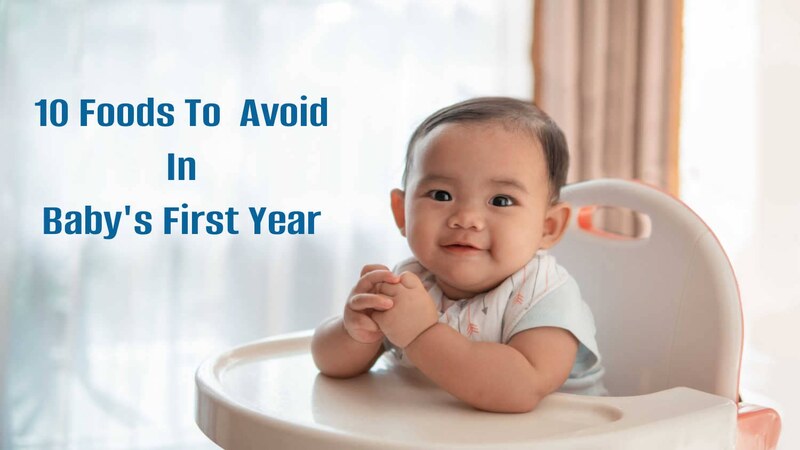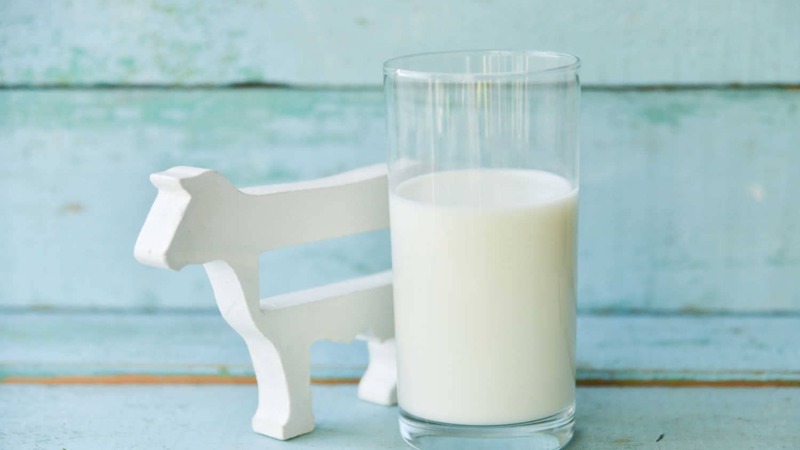
Baby’s first year is full of achieving new milestones at every step. It is not only for the baby because he is growing so fast but for the mother as well. As a new parent, she needs to take care of her and also her baby’s needs. For the whole first year, babies should consume breast milk only; therefore, the baby depends on the mother. As the infant grows, his needs increase. Now it is important to understand the foods to avoid in the baby’s first year.
After six months, the baby should eat supplementary foods as his nutritional demands increase because he is growing fast in the first year. However, some foods should not be given to the baby in any case. Baby’s organs are not fully developed; they fully develop by the end of the first year. So, the mother should pay full attention to the baby‘s food, which he is putting in his mouth in the first year.
10 Foods To Definitely Avoid In Baby’s First Year
Introducing solids to your baby is an exciting milestone, but it’s important to be mindful of the foods you offer. During their first year, babies’ digestive systems are still developing, and certain foods can pose risks such as choking hazards, allergic reactions, or nutritional imbalances.
Here is a list of the top ten foods to avoid giving to your baby during the first year.
1. Cow milk

Cow’s milk is not easy to digest for the babies. It does not contain the ideal nutrients needed for the growth of a baby. It has a high amount of protein and fat content,, which may lead to damage to the kidneys and affect the digestive health of the babies. (1)
2. Egg Whites
Eggs are a very good source of protein, vitamins, and minerals but are not advised to be given to the baby before four months. You can introduce eggs at the age of around six months. Cook the eggs properly when you are giving eggs to the baby. Undercooked or raw eggs can cause health hazards to babies. (2)
3. Biscuits And Candy
All sugary foods are bad for the baby’s health. It leads to unwanted weight gain in the baby as well as oral health problems at a very early stage. Therefore, babies under one year should not eat biscuits, ice creams, or candies.
4. Honey

Honey is one of the top foods to avoid in the baby’s first year. There is a bacteria present in honey that may produce some toxins in the intestines of the baby when the baby consumes it. It can cause a very serious poisoning in infants called botulism. Also, honey is sugar, which can lead to tooth decay. Babies should not be given honey before 12 months of age. (3)
5. Canned And Processed Foods
Canned and processed foods can have several negative effects on babies, especially in their first year, when their nutritional needs are still developing and their digestive systems are more sensitive. While canned and processed foods may be convenient, they often contain ingredients that aren’t ideal for infants, including high levels of sodium, preservatives, added sugars, and unhealthy fats.
6. Raw and Undercooked Foods (Sprouts, Eggs, Meat and Fish)
Raw and undercooked foods, including sprouts, eggs, meat, and fish, pose significant health risks for babies, especially in their first year, when their immune systems are still developing and their digestive systems are more sensitive. Raw or undercooked eggs can carry Salmonella bacteria, which can cause food poisoning. Likewise, raw or undercooked meat can be contaminated with harmful bacteria like Salmonella, E. coli, or Campylobacter. These pathogens can cause severe gastrointestinal illness in babies. (4)
7. Salt

As babies develop their fully mature kidneys by the end of the first year, babies should not consume much salty food. The high content of food negatively impacts their kidneys. Avoid giving excess salts and packed and processed food to the baby.
8. Sugar
Babies do not require sugar. All his needs are fulfilled by the mother’s milk. So, mothers should not give extra sugar to the baby, as it may lead to tooth decay and obesity. Babies less than 24 months of age should not consume anything, no calorie or low-calorie sweeteners.
9. High-Mercury Fish
High-mercury fish can pose serious health risks to babies and young children (5), making it crucial to avoid them in your baby’s first year. Mercury is a toxic metal that can accumulate in the body over time and it can affect the developing brain and nervous system, potentially leading to cognitive and developmental delays. Fish such as shark, swordfish, king mackerel, and tilefish tend to have higher mercury levels and should be completely avoided in your baby’s diet.
10. Caffeine

Caffeinated drinks like coffee and tea contain tannins, which are anti-nutrients. These can hinder the absorption of essential vitamins and minerals (6), potentially affecting the development and growth of a baby.
11. Certain Cheeses
Cheeses are a healthy source of proteins, vitamins, and calcium. But some cheeses are mold-ripened cheese or blue-vined cheese, for example, camembert or Roquefort. These kinds of cheese might be a source of bacteria named listeria. (7). If a baby consumes it, it can lead to harmful effects on the baby. So you can mark it as one of the foods to avoid in the baby’s first year.
12. Unpasteurized Juices and Milk Products

Unpasteurized juices and milk products can pose serious health risks to babies, especially in their first year. These products have not been heat-treated to kill harmful bacteria, viruses, and parasites, which can lead to foodborne illnesses. For babies, whose immune systems are still developing, the risks are even greater. Unpasteurized juices (8) and milk products can contain dangerous pathogens like Salmonella, E. coli, and Listeria, which can cause severe illness in infants, leading to symptoms such as vomiting, diarrhea, fever, or dehydration.
13. Smoked And Cured Meats
Smoked and cured meats should be avoided in babies’ diets, especially during their first year, due to potential health risks. High sodium content and nitrates or nitrites used as preservatives can cause harmful compounds like nitrosamines, which can cause cancer when exposed to heat. (9)
Nutrition is crucial during a baby’s early development, and it’s essential to monitor which foods are safe for them to eat. There is more to the list of foods to avoid in the baby’s first year. It is important to do in-depth research before giving anything new to the baby. Babies should be exclusively breastfed for the first six months. After this period, you can gradually introduce solid foods. Many people give various foods to babies without knowing if they are safe. It’s important to be cautious and informed when introducing new foods to your baby.
FAQs
1. What Fruits Can Babies Not Eat?
Natural fruits are safe for babies to consume after six months of age. But the initial six months are very crucial for a baby. Babies should exclusively consume breast milk.
2. When To Start Curd For Babies?
Babies should exclusively breastfeed for the first six months. After six months, you can add curd slowly to the baby’s diet.
3. What Vegetables Should Babies Avoid?
Vegetables that are raw and uncooked are not easy to digest for the baby. You can give cooked vegetables in mashed form to the baby.
Reference
- Ko GJ, Rhee CM, Kalantar-Zadeh K, Joshi S. The Effects of High-Protein Diets on Kidney Health and Longevity. J Am Soc Nephrol – https://pmc.ncbi.nlm.nih.gov/articles/PMC7460905/
- The AskUSDA, US Department Of Agriculture – https://ask.usda.gov/s/article/Who-is-at-risk-for-eating-raw-or-undercooked-eggs
- CDC Nutrition – https://www.cdc.gov/nutrition/infantandtoddlernutrition/foods-and-drinks/foods-and-drinks-to-limit.html
- Brentwood (TN): Organization of Teratology Information Specialists (OTIS); 1994-. Eating Raw, Undercooked, or Cold Meats and Seafood. 2024 Jan – https://www.ncbi.nlm.nih.gov/books/NBK582930/
- Leyre Notario Barandiaran, Julia A. Bauer, Brian P. Jackson, Margaret R. Karagas, Fish intake and mercury exposure in young children, Environmental Research,Volume 257,2024,119277,ISSN 0013-9351 – https://www.sciencedirect.com/science/article/abs/pii/S0013935124011824
- Delimont NM, Haub MD, Lindshield BL. The Impact of Tannin Consumption on Iron Bioavailability and Status: A Narrative Review – https://pmc.ncbi.nlm.nih.gov/articles/PMC5998341/
- Guenther S, Loessner MJ. Bacteriophage biocontrol of Listeria monocytogenes on soft ripened white mold and red-smear cheeses. Bacteriophage. 2011 Mar;1(2):94-100 – https://pmc.ncbi.nlm.nih.gov/articles/PMC3278646/
- From the American Academy of Pediatrics; Melvin B. Heyman, MD; Steven A. Abrams, MD; SECTION ON GASTROENTEROLOGY, HEPATOLOGY, AND NUTRITION; COMMITTEE ON NUTRITION; Leo A. Heitlinger, MD; Michael deCastro Cabana, MD; Mark A. Gilger, MD; Roberto Gugig, MD; Ivor D. Hill, MD; Jenifer R. Lightdale, MD; Stephen R. Daniels, MD; Mark R. Corkins, MD; Sarah D. de Ferranti, MD; Neville H. Golden, MD; Sheela N. Magge, MD; Sarah J. Schwarzenberg, MD – https://publications.aap.org/pediatrics/article/139/6/e20170967/38754/
- Shakil MH, Trisha AT, Rahman M, Talukdar S, Kobun R, Huda N, Zzaman W. Nitrites in Cured Meats, Health Risk Issues, Alternatives to Nitrites: A Review – https://pmc.ncbi.nlm.nih.gov/articles/PMC9654915/
